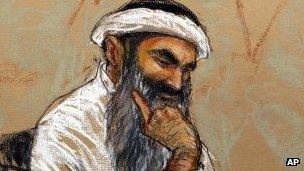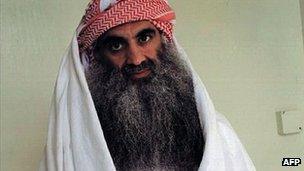Khalid Sheikh Mohammed Guantanamo hearing gets chaotic start
- Published

Khalid Sheikh Mohammed remained silent in court
The military tribunal at Guantanamo Bay set up to prosecute the five leading 9/11 suspects has been hit by a series of disruptions on its opening day.
Khalid Sheikh Mohammed and four others accused of plotting the 2001 attacks refused to respond to questions during the nine-hour hearing.
One launched into a defiant outburst, suggesting the Americans might kill him before the end of the trial.
The five refused to enter pleas on murder and terrorism charges.
The charges, over the attacks in which 2,976 people died, can carry the death penalty.
They will now be asked again to enter pleas of guilty or not guilty at a later hearing.
'So hard'
The men are being tried by a military tribunal after an attempt to transfer them to a US civilian court in 2009 failed in the face of a public outcry and Congressional opposition.
Newly introduced rules include a ban on evidence obtained under torture. But defence lawyers still say the Guantanamo trial system lacks legitimacy because of restricted access to their clients.
The defendants are accused of planning and executing the attacks of 11 September 2001, which saw hijacked planes strike New York, Washington and Shanksville, Pennsylvania.
A small number of victims' relatives attended Saturday's hearing at the military complex.

Self-proclaimed 9/11 "mastermind" Khalid Sheikh Mohammed is being tried with Waleed bin Attash, Ramzi Binalshibh, Ali Abd al-Aziz Ali and Mustafa Ahmad al-Hawsawi.
The arraignment hearing - in which the defendants are read the charges against them - was first delayed when Waleed bin Attash arrived in court restrained in his chair.
The restraints were later removed after defence counsel had given assurances that he would "behave".
Another defendant, Ramzi Binalshibh, knelt and prayed for several minutes.
Mohammed, wearing a white turban and a flowing beard, refused to answer the judge's questions. His lawyer said he was refusing to listen to the judge in protest at his alleged torture in custody and because he believed the tribunal was unfair.
The hearing was further delayed when all the defendants refused to wear the earphones that provide translation into Arabic.
It later resumed with an Arabic translator present in court - ensuring that the accused could follow proceedings.
Ramzi Binalshibh eventually attempted to address the court. When told by the judge he could speak later he replied: "Maybe you're not going to see us any more. Maybe they will kill me and say I committed suicide."
The judge, Col James Pohl, struggled to keep the proceedings on track. "Why is this so hard?" he asked at one point.
The decision to hold a military rather than a civilian trial remains controversial and follows a lengthy legal wrangle over where the five men would face justice.
One of the defendants' lawyers, James Connell, predicted the trial would take years to complete.
Torture claim
Khalid Sheikh Mohammed, who is of Pakistani origin but was born in Kuwait, was captured in Pakistan in 2003 and transferred to the Guantanamo base in Cuba in 2006.
During an earlier attempt to try him before a military tribunal in 2008, he said he intended to plead guilty and would welcome martyrdom.
In 2009 the Obama administration, which pledged to close Guantanamo, tried to move the trial to New York, but reversed its decision in 2011 after widespread opposition.
The five were eventually charged in June 2011 with offences similar to those they were accused of by the Bush administration.
The Pentagon has previously said Khalid Sheikh Mohammed admitted he was responsible "from A to Z" for the 9/11 attacks.
US prosecutors allege that he was involved with a host of other terrorist activities.
These include the 2002 nightclub bombing in Bali, Indonesia, the 1993 World Trade Center bombing, the murder of American journalist Daniel Pearl and a failed 2001 attempt to blow up an airliner using a shoe bomb.
Khalid Sheikh Mohammed has alleged that he was repeatedly tortured during his detention in Cuba.
CIA documents confirm that he was subjected to simulated drowning, known as waterboarding, 183 times.
- Published5 May 2012
- Published30 April 2013
- Published3 May 2011
- Published1 September 2011
- Published4 April 2012
- Published1 March 2012